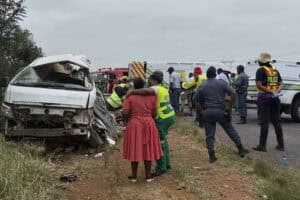Just execute the Road Accident Fund Act properly, says non-profit.

The Association for the Protection of Road Accident Victims (Aprav) has appealed to Transport Minister Barbara Creecy to stop her plans to reintroduce the Road Accident Benefit Scheme (RABS) Bill.
When Creecy recently announced the disbandment of the Road Accident Fund (RAF) board, she confirmed her plans to revive the bill to establish a no-fault, defined benefit scheme, which, she said, will “make it easier for road accident victims to access the benefits without costly legal bills”.
Aprav is a non-profit organisation of professionals acting on behalf of road accident victims. It was established in 2014 and has long been opposed to the RABS Bill, which has been introduced to parliament multiple times without success.
ALSO READ: Creecy dissolves RAF board amid governance and operational failures
A ‘Sandton bill’
During a media briefing hosted by the National Press Club in Pretoria, Aprav deputy chair Ngoako Mohlaloga characterised the RABS Bill as a “Sandton bill”.
He said the proposed scheme had been devised in offices in Sandton by people who do not understand the challenges of the majority of poor South Africans who live in rural areas without proper transport and easy access to health facilities.
Mohlaloga said road accident victims are victimised twice – first by the accident itself and then by the RAF system. This will become even worse if the RABS is introduced, he said.
The RAF is currently in turmoil. There is no board, the CEO has been suspended, and the Special Investigation Unit is looking into the fund regarding allegations of corruption, maladministration, and financial losses. A massive backlog of claims is clogging court rolls due to a low settlement rate.
ALSO READ: Outa welcomes dissolving of RAF board and cancelling of license card tender
‘Every accident is different’
In terms of the proposed scheme, the compensation for each class of injury is predetermined, “but every accident is different, and the circumstances of victims are not the same”, said Mohlaloga. He added that under the no-fault system, liability is not considered and rehabilitation will rely on the National Health Insurance (NHI).
“For RABS to work, the NHI must be fully operational.”
For various reasons, this is not expected to be the case for many years.
Mohlaloga explained that people living in villages do not have access to ambulances and there are often very few cars – “and those that are there don’t have petrol”.
Any delay in getting to hospital reduces the chance of successful rehabilitation.
He said the RABS Bill had previously been rejected by the Parliamentary Portfolio Committee on Transport because it was unaffordable and unconstitutional. The committee asked government to reconsider its revival.
In 2022, the portfolio committee asked for proposals to resolve the RAF’s challenges – and Aprav made extensive submissions.
The organisation believes the current system will work if the RAF “gets its house in order” and properly implements the existing law.
Mohlaloga added that government’s contingent liability concerning the RAF will not disappear with the introduction of the proposed scheme but will increase by 60%. (The contingent liability amounts to R368 billion in the budget tabled for 2025/26.)
ALSO READ: RAF needs a Settlement Hub for crash victims – expert
Context
Aprav chair Pieter de Bruyn said every aspect of the RAF system has already been tested in court, which means there is a high degree of legal certainty.
He said the majority of South Africans are too poor to pay for legal representation to get compensation in court, which prompted government to step in and provide a compensation system through the RAF.
However, the RAF was created 30 years ago under vastly different conditions.
The Satchwell Commission made several proposals to improve it years ago, but politicians weren’t interested in acting on them.
Aprav has, however, proposed a 10-point plan for a turnaround at the RAF to parliament and is asking Creecy to look at it rather than embark on another campaign to establish the RABS.
De Bruyn said the campaign would waste another three or four years, and eventually fail.
ALSO READ: RAF notice that saw claimants ‘excluded’ declared unconstitutional
Poor will be excluded
He added that to submit a claim, victims will have to send an e-mail and then submit an eight-page form “that I find difficult” electronically. They will get feedback via SMS, and if it is rejected, they can appeal to the same body that initially rejected it.
He said poor people without smartphones and Wi-Fi access will simply be excluded.
If successful, administrative staff will decide on the compensation, which will lapse after 15 years. Compensation will only be paid monthly, with no provision for significant initial expenses such as operations. The scheme’s monthly payments will be exponentially more than those the RAF is currently making, which will be a huge administrative challenge.
As Mohlaloga puts it: “The bill offers less money, fewer rights, and no path to challenge the system when it fails you.”
This article was republished from Moneyweb. Read the original here.






